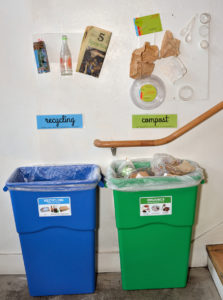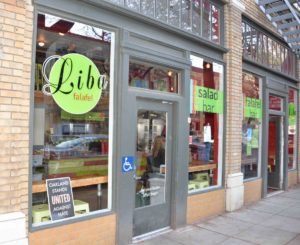
We support the historic efforts by the Black Lives Matter movement, seen here at a march in Oakland, May 2020.
Photos: Thomas Hawk, CC license (left); Daniel Arauz, CC license (right).
We are living in truly historic times, a potential turning point for race relations in this country. At Gigantic, we acknowledge our place of privilege, and are working to use the learnings from environmental behavior change to make our work and our company more effective change agents. Studies show that racial injustice and climate injustice are intimately intertwined — one cannot be addressed without addressing the other. We recognize that working for environmental justice must be at the center of our efforts moving forward.
Making solutions that work for all communities starts with listening to under-heard Black, Indigenous and People of Color (BIPOC) voices now and from the past. We honor and learn from the work of those who have come before in striving for environmental justice, including Van Jones and DreamCorps/Green for All, the California Environmental Justice Alliance, the Greenlining Institute, Planting Justice and so many more activist and outreach organizers in the Bay Area, from the Black Panthers to Diablo Rising Tide.
We recognize that we have much more to learn, but also that actions must accompany words in pursuit of environmental justice.
As we know from our work, commitment, especially public commitment, is a key tool for behavior change. Therefore, we are making some initial public commitments:
- Gigantic will work with industry organizations (such as NCRA and CRRA) to create and support leadership pathways (e.g. scholarships and donations) for BIPOC interested in zero waste professions. Starting now, we are adopting a company policy to set a yearly goal for donated money and labor to support this important work. For 2020 we will donate up to $2,000 in financial support and $2,000 in Gigantic staff labor hours to fulfill this goal.
- We pledge to actively advocate for BIPOC-centered spaces in our industry at the discretion and leadership of BIPOC professionals/community members.
- We will continue to engage our clients in conversations around inclusive stakeholder engagement and true representations in all media, keeping environmental justice top of mind.
- Further, we recognize that this is a process that will require ongoing, sometimes difficult, work as a company to track and incorporate racial and environmental justice values in our practices, and we will consciously dedicate time to regularly evaluate our progress and set challenging goals.
Bolstered by heroic past examples and inspired by present actions and activists, we are hopeful these contributions, however small, will help progress toward a just and sustainable future.
 Often in the course of our work we are lucky enough to run into local residents who embody the environmental attitudes that we cherish. Often those people are exemplary in other ways, as well. The Gigantic team met Gail Lillian on a photo shoot for recycling and composting in the food service industry. Her business—
Often in the course of our work we are lucky enough to run into local residents who embody the environmental attitudes that we cherish. Often those people are exemplary in other ways, as well. The Gigantic team met Gail Lillian on a photo shoot for recycling and composting in the food service industry. Her business—
